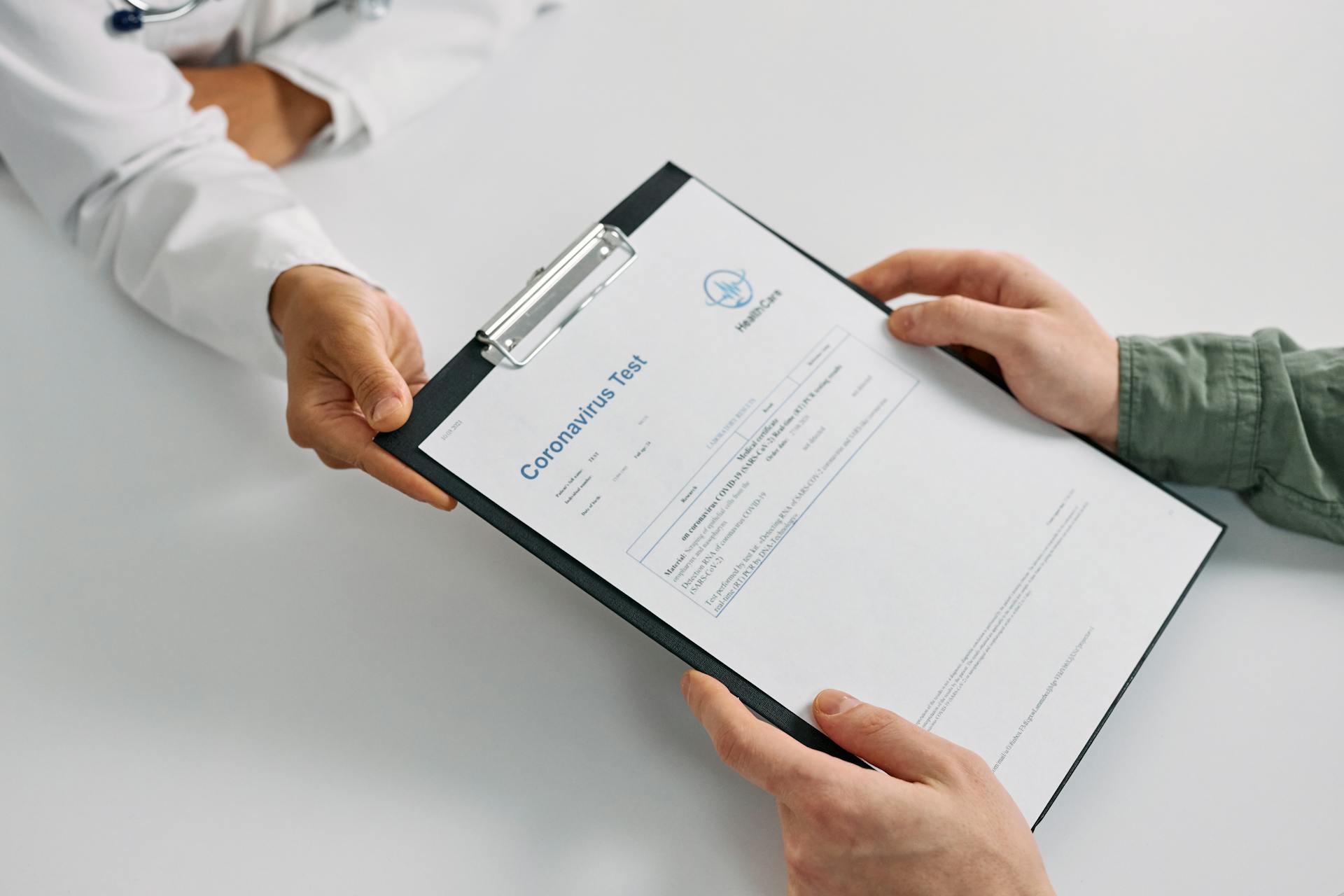
Medical bills can be a significant financial burden, but there's good news: some of these expenses may be tax deductible. You can claim medical expenses on your tax return if they exceed 7.5% of your adjusted gross income.
If you have high medical bills, it's worth exploring tax deductions to reduce your taxable income. The IRS allows deductions for expenses like doctor visits, hospital stays, and prescription medications.
To qualify for medical expense deductions, you'll need to itemize your deductions on your tax return. This means you'll need to keep receipts and records of your medical expenses to support your deductions.
Medical expenses can be a significant deduction, especially for those with chronic conditions or ongoing medical needs.
Worth a look: 401k Tax Deductions Work
What Is Tax Deductible
Tax deductibility can be a complex topic, but it's essential to understand what's eligible for a deduction. Medical bills are indeed tax deductible, but only certain expenses qualify.
To be eligible, medical expenses must exceed 7.5% of your adjusted gross income (AGI), according to the article. This threshold applies to everyone, regardless of age or income level.
Expenses that are typically tax deductible include doctor visits, hospital stays, surgeries, and even some prescription medications, like insulin for diabetics.
Recommended read: List of Business Expenses for Taxes
What Is an Expense
An expense is a cost or expenditure related to your medical or dental care. To qualify as a deductible expense, it must be unreimbursed, meaning you didn't get paid back for it.
Qualified medical and dental expenses include costs for doctor visits, hospital stays, prescriptions, and more. These expenses can be deducted on Schedule A Form 1040 or 1040-SR if you itemize your deductions.
To be eligible for a deduction, your expenses must exceed 7.5% of your adjusted gross income (AGI). For example, if your AGI is $50,000, you could deduct expenses that exceed $3,750.
Lactation expenses, such as breast pumps and milk storage bags, can also be considered medical expenses and deducted. These expenses are specifically mentioned in the IRS guidelines.
Not all medical expenses are created equal. To qualify for a deduction, the expense must be for a qualified medical or dental service. This means expenses for cosmetic procedures, such as plastic surgery, are not eligible for a deduction.
Some examples of qualified medical expenses include:
- Doctor visits and hospital stays
- Prescriptions and medications
- Lactation expenses, such as breast pumps and milk storage bags
Keep in mind that you'll need to itemize your deductions on Schedule A Form 1040 or 1040-SR to take advantage of these deductions.
Readers also liked: Day Trader Tax Deductions
What Are
So, what are tax deductions? Simply put, they're expenses you can subtract from your income to lower your tax bill.
Charitable donations are a popular tax deduction, and for good reason - they can add up to a significant amount on your tax return.
Business expenses, like the cost of equipment and supplies, can also be deducted.
Medical expenses, such as doctor visits and prescriptions, are another type of deduction.
Home office expenses, like rent and utilities, can be deducted if you work from home.
Education expenses, like tuition and fees, can be deducted for certain types of education.
Related reading: Is Second Home Mortgage Interest Deductible
Types of Medical Expenses
Medical expenses can be a significant financial burden, but there are some costs that are tax deductible. Blood-testing kits, including blood strips and batteries, are deductible.
Some medical expenses are more straightforward than others. Insulin, for example, is deductible, even though it's not technically viewed as a prescription drug.
Is
Is long-term care insurance tax-deductible? You can deduct long-term care insurance premiums just like health insurance premiums, but you must itemize your deductions and your combined premium payments must exceed 7.5% of your AGI.
Additional reading: Charity Care for Medical Bills
If you're self-employed, you can deduct your monthly long-term care insurance costs, no matter the amount. Not all long-term care insurance policies qualify for tax deductions, so be sure to ask your broker or provider if your policy meets the necessary regulatory standards.
To qualify for tax deductions, a long-term care policy must have nonforfeiture benefits and allow for automatic renewal. The IRS sets a maximum dollar amount you can deduct from your taxes based on your age.
For more insights, see: Can I Deduct My Health Insurance Premium
Adaptive Equipment
Adaptive equipment can make a big difference in the lives of people with disabilities, and fortunately, many of these costs are deductible. You can deduct the costs of wheelchairs, bath chairs, and bedside commodes, among other items.
Special hand controls and other special equipment installed in cars for people with disabilities are also deductible. This can be a huge help for individuals who rely on their vehicles for daily transportation.
People with hearing or speech disabilities can deduct the cost of special telephone equipment, such as teletypewriter (TTY) and telecommunications device for the deaf (TDD) equipment. This can greatly improve their ability to communicate with others.
Artificial limbs, such as prosthetic devices, and artificial teeth are also deductible medical expenses. These types of expenses can be crucial for individuals who require them to perform daily tasks.
Curious to learn more? Check out: Are Refi Closing Costs Tax Deductible
Alternative Treatments
Acupuncture is definitely deductible, so be sure to keep those records.
If a doctor orders alternative treatments, they may also be deductible, especially if you're seeking nontraditional medical help.
Trips to the chiropractor are also deductible, so don't forget to claim those expenses.
Even Christian Science practitioners are considered deductible, so don't overlook those visits either.
Other alternative treatments may be deductible too, but be sure to check with your doctor first to see if they're ordered by a medical professional.
On a similar theme: Medical Bills Injury Case Doctor
Costs for Newborns
Breast pumps and other nursing supplies that assist lactation can be deducted as medical expenses.
These supplies can help make breastfeeding easier and more comfortable, but they can also be a significant expense.
If your baby formula requires a prescription, the cost in excess of the cost of the regular formula may be allowed as a medical expense.
Diabetes-Related Costs
Diabetes-related costs can add up quickly, but there are some expenses you can deduct. Blood-testing kits, including blood strips and batteries, are deductible.
If you have diabetes, you're likely no stranger to the cost of insulin. Fortunately, insulin is also deductible, even though it's not technically viewed as a prescription drug.
These deductions can help make managing diabetes a little more affordable.
Home Care
Home care can be a significant expense for individuals with disabilities or chronic illnesses.
The cost of a personal attendant is deductible for someone unable to manage activities of daily living (ADL).
This includes personal assistance with daily routines, but not the cost of housecleaning and other chores.
You can include the cost of the caregiver's meals and additional amounts you paid for related household upkeep, such as extra utilities or rent.
For example, if you rent a larger apartment to provide space for the person, you can deduct the extra rent as a related household expense.
Recommended read: Extra Help with Medical Bills
HSAs and FSAs
If you don't itemize deductions on your federal tax return, you can still score tax benefits by taking advantage of an HSA or FSA.
Both accounts let you set aside untaxed money for copays, deductibles, and coinsurance, as well as prescription and over-the-counter medicine.
Self-Employed and Business-Related Expenses
As a self-employed individual, you're entitled to a standard deduction for medical insurance premiums, which can reduce your AGI. This deduction applies to premiums paid for yourself, your spouse, and your dependents.
You can also deduct premiums paid for dental insurance and long-term care insurance that covers you, your spouse, and/or your dependents.
Additional reading: Can You Claim Life Insurance Premiums on Your Taxes Canada
Home Improvements

Home improvements can be a great way to make your home more accessible and comfortable, especially if you have a disability. However, to qualify as a medical expense, the cost must be above any increase in your home's value.
If you install permanent features or renovate your home, the cost may be fully deductible. This includes constructing ramps, widening doorways, and adding support bars.
Only reasonable costs to accommodate a person with a disability are considered medical care. Additional costs for personal motives, such as architectural or aesthetic purposes, don't count as medical expenses and can't be deducted.
For example, installing a swimming pool or steam room that increases your home's value by more than the cost isn't deductible.
For your interest: Can You Claim Home Insurance Deductible on Taxes
Lodging
Lodging can be a significant expense for self-employed individuals and business owners, especially when traveling for work or medical care. You can deduct the cost of lodging while away from home if it meets certain requirements.

The lodging must be primarily for and essential to medical care, and the medical care must be provided by a doctor in a licensed medical care facility. This is a crucial distinction, as not all medical care settings qualify for lodging deductions.
For example, if a parent travels with a sick child to receive medical care, they can deduct up to $100 per night for lodging. This amount is calculated based on $50 per night for each person, including the child.
The lodging itself must not be lavish or extravagant under the circumstances, and the stay must not be for personal pleasure, recreation, or vacation. This means that if you're traveling to a resort or luxury hotel, you may not be able to deduct the full cost of the lodging.
Here's a summary of the lodging deduction rules:
By following these rules, you can ensure that you're taking advantage of the lodging deduction and reducing your taxable income.
Self-Employed
As a self-employed individual, you have unique expenses that can be deducted from your taxes. You can claim medical insurance premiums paid for yourself, your spouse, and dependents as a standard deduction, which reduces your Adjusted Gross Income (AGI).
Self-employed individuals can also claim an adjustment to income for health insurance premiums, regardless of whether they itemize or not. This deduction applies to premiums paid for health, dental, and long-term care insurance that covers you, your spouse, and/or dependents.
However, if you or your spouse is eligible for an employer-sponsored health insurance plan, you won't be able to claim this deduction.
To claim medical expenses, you'll need Schedule A (Form 1040) and receipts for qualified expenses. You can include out-of-pocket medical insurance premiums, but not if you claimed the self-employment health insurance deduction.
Here's a summary of the steps to claim your medical deduction:
- Total up your qualified medical expenses and premiums for the year.
- Include any out-of-pocket medical insurance premiums you've paid.
- Subtract any reimbursements paid to you.
- Report your total medical expenses on line one of Schedule A.
The IRS allows you to deduct 100% of your unreimbursed, qualified medical and dental expenses that exceed 7.5% of your Adjusted Gross Income (AGI). For example, if your AGI is $50,000, you could deduct expenses that exceed $3,750.
To calculate your deduction, follow these steps:
- Total up your qualified medical expenses and premiums for the year.
- Subtract 7.5% of your Adjusted Gross Income (AGI).
- Deduct the amount that exceeds the result from step 2.
Deduction Methods and Limits
If you're self-employed and have a net profit for the year, you can claim medical insurance premiums you pay for yourself, your spouse, and your dependents as a standard deduction for medical insurance that reduces your AGI.
The standard deduction for married couples who jointly file one return is $27,700 for the 2023 tax year, while single taxpayers and married individuals filing separately get a standard deduction of $13,850.
To determine if you should itemize your expenses, add up all eligible itemized expenses, including medical, and compare that number with the standard deduction that would apply to you. If your itemized expenses total more than your standard deduction amount, you would save money by taking the time to itemize.
You can use the IRS tool to help you determine what medical expenses are deductible. The IRS recommends itemizing if the dollar total of your eligible itemized deductions exceeds the standard deduction or if you can't take a standard deduction.
Qualifying medical expenses that are less than 7.5% of your adjusted gross income (AGI) are not deductible; eligible medical expenses that exceed 7.5% of your AGI are. To give you a better idea, here's a breakdown of the limit:
If you're in the 24% tax bracket, a $4,000 deduction saves you roughly $960 in taxes.
Eligibility and Exclusions
You can deduct medical expenses for yourself, your spouse, and your dependents. This includes qualifying medical and dental expenses for children under 18 years old.
To qualify for the deduction, the medical expenses must be for a legitimate medical purpose, not just for general health and wellness. For example, you can't deduct the cost of a trip taken for the sole purpose of improving your health.
Here are some examples of who qualifies for the medical expense deduction:
- You
- Your spouse
- Your dependents
- A service animal, but not your pets
Some expenses are not deductible, including insurance premiums paid through an employer-sponsored health plan, funeral or burial expenses, and nonprescription medicines. Additionally, medical expenses paid for or partially paid for through insurance or a health savings account (HSA), flexible spending account (FSA), or health reimbursement arrangement (HRA) are not deductible.
For more insights, see: Who Is Responsible for Medical Bills Not Covered by Insurance
Federal Premium Subsidies Eligibility
You may qualify for an income-based premium subsidy, also called an advance premium tax credit (APTC), for coverage you bought through the Health Insurance Marketplace.
If you qualify, any premium you pay that's reimbursed by an APTC can't be deducted from your taxes, but any remaining premium can be deducted.
You can now go up to two years without filing a tax return and still be eligible for federal subsidies.
If your APTC is higher than your eligible tax deduction, the difference is subtracted from your refund or added to your balance due.
Take a look at this: Can You Claim Your Insurance Premiums on Your Taxes
Which Are Not?
If you're wondering which medical expenses aren't eligible for a tax deduction, the list is a bit longer than you might think.
You can't deduct medical expenses that are reimbursed by your insurance company or employer, including premium tax credits that reduce your health insurance costs. This means that if you're covered by an employer-sponsored health plan, those premiums are not deductible as medical expenses.
You might enjoy: 1095-a Self Employed Health Insurance Deduction

Other non-deductible expenses include cosmetic procedures unrelated to your health, nonprescription drugs, and general items like toothpaste, vitamins, or diet foods. You also can't deduct funeral or burial expenses, trips taken with the general goal of improving your health, or cosmetic surgery.
Here are some specific examples of non-deductible health-related expenses:
- Insurance premiums paid through an employer-sponsored health plan
- Funeral or burial expenses
- Nonprescription medicines, toiletries, toothpaste or cosmetics
- Trips taken with the general goal of improving health
- Cosmetic surgery
- Nonprescription nicotine patches or gum
It's also worth noting that medical expenses paid for or partially paid for through insurance, a health savings account (HSA), flexible spending account (FSA), Archer medical savings account (MSA), or health reimbursement arrangement (HRA) are not deductible. If you're self-employed and claim the self-employment health insurance deduction, you can't also deduct these premium expenses as medical expenses.
For another approach, see: Do Lawyers Get Paid before Medical Bills
Frequently Asked Questions
What are IRS qualified medical expenses for HSA?
IRS qualified medical expenses for HSA include expenses for doctor-recommended treatments and services such as physical therapy, psychiatric care, and special education expenses for children with learning disabilities. Examples also include personal protective equipment, psychoanalysis, and speech therapy.
Can they take medical bills out of your taxes?
Yes, you can deduct medical bills from your taxes if you itemize your deductions and the expenses exceed 7.5% of your adjusted gross income. This can help reduce your taxable income and lower your tax bill.
Sources
- https://www.valuepenguin.com/health-insurance-tax-deductible
- https://tax.ohio.gov/faq-HealthExpenses
- https://www.capitalone.com/learn-grow/money-management/are-medical-expenses-tax-deductible/
- https://www.experian.com/blogs/ask-experian/are-medical-expenses-tax-deductible/
- https://www.investopedia.com/articles/personal-finance/081615/20-medical-expenses-you-didnt-know-you-could-deduct.asp
Featured Images: pexels.com


